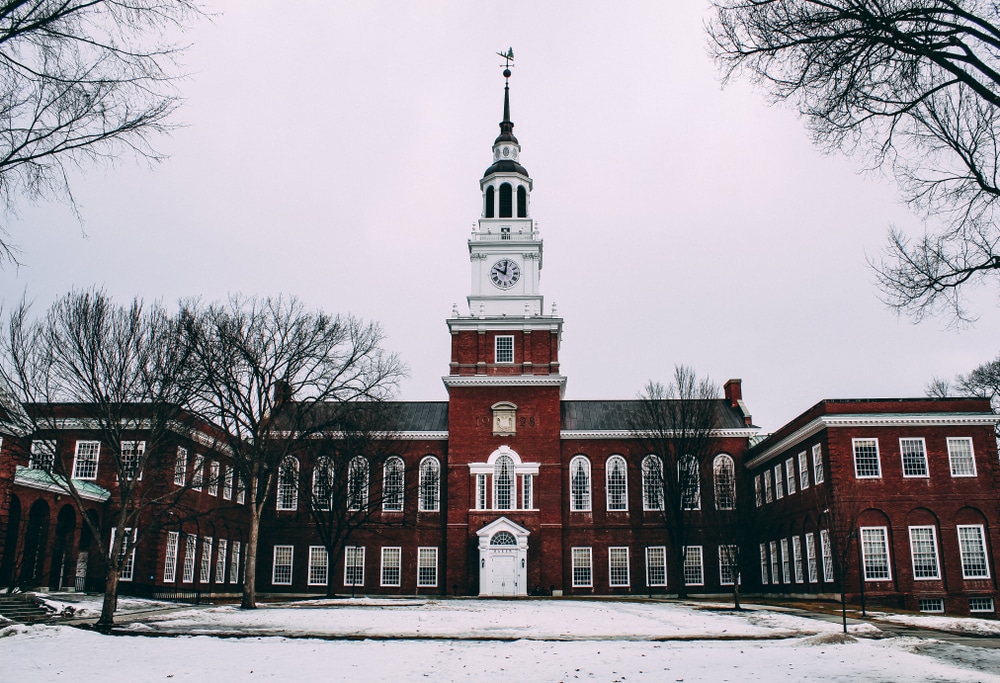Dartmouth vs Amherst: Which College is Right for You?
If you’re a high school senior or a soon-to-be college student, you may have come across two prestigious colleges located in New England: Dartmouth and Amherst. Both schools have a long history dating back to the 18th century and offer top-notch academic programs, but how do you choose which one is right for you? In this article, we’ll compare Dartmouth vs Amherst based on various factors to help you make an informed decision.
Dartmouth vs Amherst: Location and Campus Comparison
One of the first things to consider when choosing a college is its location and campus. Although both Dartmouth and Amherst are located in New England, their campuses differ significantly. Dartmouth College is situated in Hanover, New Hampshire, a small town with a population of fewer than 15,000 people, while Amherst College is located in the larger city of Amherst, Massachusetts, which boasts a population of over 37,000 people.
Dartmouth’s campus is known for its beautiful natural scenery, surrounded by the White Mountains of New Hampshire. With its Ivy League charm and picturesque landscapes, it’s a great choice for students who prefer a quieter, more rural setting. Amherst, on the other hand, offers a suburban location with access to urban amenities, making it a suitable option for students who want the best of both worlds.
Another factor to consider when comparing the campuses of Dartmouth and Amherst is their size. Dartmouth’s campus spans over 269 acres, while Amherst’s campus covers 1,000 acres. This means that Amherst has more space for facilities such as sports fields, research centers, and student housing. However, Dartmouth’s smaller campus size creates a more intimate and tight-knit community among students and faculty.
Additionally, both colleges have unique architectural styles that reflect their histories and traditions. Dartmouth’s campus features a mix of colonial and modern buildings, while Amherst’s campus is known for its neoclassical architecture. These distinct styles add to the overall atmosphere and character of each campus, and may appeal to different students based on their personal preferences.
Dartmouth vs Amherst: Academic Programs and Curriculum
Both Dartmouth and Amherst offer a wide range of academic programs and have a reputation for providing top-notch education. Dartmouth offers 56 majors and 38 minors in arts, engineering, humanities, sciences, and social sciences. The college also provides various study abroad opportunities for students to expand their horizons.
Amherst College, on the other hand, offers over 40 majors in fields such as arts, humanities, social sciences, and natural sciences. The college has a notable focus on interdisciplinary studies, providing students with a well-rounded education and a broad range of career opportunities ahead.
In addition to their undergraduate programs, both Dartmouth and Amherst offer graduate programs for students who wish to further their education. Dartmouth offers graduate programs in fields such as business, engineering, and medicine, while Amherst offers graduate programs in fields such as neuroscience and computer science.
Furthermore, both colleges have a strong emphasis on research and provide opportunities for students to engage in research projects with faculty members. These research opportunities allow students to gain hands-on experience in their field of study and contribute to the advancement of knowledge in their respective fields.
Dartmouth vs Amherst: Admissions Requirements and Acceptance Rates
Getting into Dartmouth or Amherst is no easy feat, as both colleges have a highly selective admission process. According to the most recent data, Dartmouth College has an acceptance rate of 8.7%, making it one of the most competitive colleges in the United States. Amherst College’s acceptance rate is slightly higher, at 11.6%.
Dartmouth and Amherst both have high academic requirements, with an average SAT score of 1466 and 1475, respectively. Both colleges also look beyond the academic qualifications, placing considerable emphasis on applicants’ essays, extracurricular activities, and character.
In addition to academic qualifications, Dartmouth and Amherst also consider other factors when evaluating applicants. Both colleges value diversity and seek to admit students from a variety of backgrounds. They also look for students who have demonstrated leadership skills, community involvement, and a passion for learning.
Once accepted, students at Dartmouth and Amherst can expect a rigorous academic experience. Both colleges have a strong liberal arts curriculum, with a focus on critical thinking and intellectual exploration. Students are encouraged to pursue their interests and engage in research, internships, and study abroad programs.
Dartmouth vs Amherst: Cost of Attendance and Financial Aid
Attending college can be expensive, and both Dartmouth and Amherst are no exception. The cost of attendance for the 2021-2022 academic year at Dartmouth College is $80,782, while Amherst College’s cost of attendance is $78,200. However, both colleges offer a robust financial aid package for eligible students.
Dartmouth has a need-based financial aid policy, which means that the college will cover 100% of demonstrated financial need for admitted students. Amherst College also practices a similar policy, with 60% of its student body receiving some form of financial aid.
It is important to note that the cost of attendance at both Dartmouth and Amherst includes not only tuition and fees, but also room and board, books and supplies, and personal expenses. However, students can reduce their expenses by applying for scholarships, grants, and work-study programs.
Additionally, both colleges offer resources to help students manage their finances. Dartmouth has a Financial Aid Office that provides counseling and assistance with budgeting, while Amherst has a Student Financial Services Office that offers financial literacy workshops and one-on-one consultations.
Dartmouth vs Amherst: Student Life and Extracurricular Activities
Besides academics, student life and extracurricular activities are also important considerations when choosing a college. At Dartmouth, students can participate in over 300 student organizations, including clubs and teams for sports, music, theater, and public service. Fraternities and sororities also play a significant role in campus life, with over 50% of undergraduate students being members of Greek organizations.
Amherst College also offers a diverse range of extracurricular activities, including student-run clubs, organizations, and athletic teams. The college’s strong emphasis on interdisciplinary studies has led to the founding of specialized organizations, such as the Law, Jurisprudence, and Social Thought Program and the Environmental Studies Program.
Furthermore, both Dartmouth and Amherst offer unique opportunities for students to engage in research and independent study projects outside of the classroom. Dartmouth’s Undergraduate Research Opportunities Program (UROP) provides funding and support for students to conduct research with faculty members in various fields. Amherst’s Independent Study Program allows students to design and pursue their own research projects with the guidance of a faculty advisor.
Additionally, both colleges have a strong commitment to community service and civic engagement. Dartmouth’s Tucker Foundation offers numerous service opportunities for students, including alternative break trips and local volunteer projects. Amherst’s Center for Community Engagement connects students with community organizations and provides resources for service-learning courses and projects.
Dartmouth vs Amherst: Athletics and Sports Programs
Dartmouth and Amherst both have robust athletics programs, with student-athletes competing in various sports at the NCAA Division I and Division III levels, respectively. Dartmouth College is a member of the Ivy League Conference and has a total of 35 varsity teams. The college’s historic rivalry with Harvard University is celebrated annually in the legendary “Dartmouth-Harvard Bonfire.
Amherst College is a member of the New England Small College Athletic Conference (NESCAC) and fields 27 varsity teams. The college has a noteworthy rivalry with Williams College, with the two schools competing in the annual “Little Three” athletics event.
Both Dartmouth and Amherst offer a wide range of sports programs beyond varsity athletics. Club sports, intramural leagues, and recreational activities are available to all students, regardless of skill level. These programs provide opportunities for students to stay active, make new friends, and develop leadership skills. Additionally, both colleges have state-of-the-art athletic facilities, including fitness centers, swimming pools, and outdoor fields, that are accessible to all members of the campus community.
Dartmouth vs Amherst: Campus Housing and Dining Options
Both Dartmouth and Amherst provide on-campus housing for students, with different housing options available depending on the year of study. Dartmouth College guarantees four years of on-campus housing for undergraduate students and offers a variety of options, including traditional dorms, suites, and apartments. The college’s dining program is also highly-rated, with various dining halls and cafes providing diverse culinary experiences.
Amherst College also offers on-campus housing for all four years, with various options such as singles, doubles, and suites. The college is also renowned for its sustainable and locally-sourced dining program, with the Valentine Dining Hall receiving multiple accolades for its environmentally-friendly practices.
In addition to on-campus housing and dining options, both Dartmouth and Amherst offer various resources and support services for students living on campus. These include resident advisors, counseling services, and community-building events and activities. Students can also take advantage of campus facilities such as fitness centers, libraries, and study spaces to enhance their academic and personal growth.
Dartmouth vs Amherst: Alumni Networks and Career Opportunities
After graduating from college, the alumni network and career opportunities available play a crucial role in a student’s success. Both Dartmouth and Amherst have active alumni associations, offering networking events, mentorship opportunities, and career guidance.
Dartmouth College has a notable alumni community, with notable alumni such as Dr. Seuss, Robert Frost, and Mindy Kaling. The college’s career center provides various resources to students, from job postings to resume reviews, to prepare them for the workforce.
Amherst College’s alumni network comprises notable figures such as former U.S. President Calvin Coolidge and Nobel Prize winner Harold E. Varmus. The college is renowned for its dedication to helping students achieve successful careers, with the career center providing personalized guidance and support to students at all stages of their careers.
Aside from the alumni associations, both Dartmouth and Amherst offer various career-related programs and initiatives to their students. Dartmouth’s Center for Professional Development provides students with access to internships, job shadowing opportunities, and career fairs. The college also offers a unique program called the Dartmouth Investment and Philanthropy Program, which allows students to gain hands-on experience in investment management and philanthropy.
Similarly, Amherst College’s Loeb Center for Career Exploration and Planning offers a range of career-related services, including career counseling, job and internship search assistance, and networking events. The center also provides funding for students to pursue unpaid internships and research opportunities, ensuring that all students have access to valuable career experiences.
Diversity and Inclusivity on Campus
Ensuring a diverse and inclusive campus is paramount in creating a positive college experience for all students. Both Dartmouth and Amherst have taken significant steps to promote diversity and inclusion on their campuses.
Dartmouth College has a dedicated Office of Pluralism and Leadership, which provides resources and support to students from historically underrepresented groups. The college also has various student-led organizations, such as the Native American Program and the Women of Color Collective, that aim to amplify marginalized voices on campus.
Amherst College also prioritizes diversity and inclusion, offering resources such as the Multicultural Resource Center and the Queer Resource Center to support students from underrepresented backgrounds. The college has also established affinity groups such as the Black Student Union, the Asian Students Association, and the Latinx Student Association to foster a sense of community among students.
Both colleges have also implemented diversity and inclusion training for faculty and staff to ensure that all members of the campus community are equipped with the knowledge and skills to create an inclusive environment. Additionally, both colleges have made efforts to diversify their faculty and staff, recognizing the importance of having a diverse group of educators and administrators to serve as role models for students.
Student Support Services and Resources
College can be challenging, and it’s essential to have access to adequate resources and support systems. Both Dartmouth and Amherst provide a wide range of support services to help students navigate college life.
Dartmouth College has a comprehensive support system, including academic advising, counseling and psychological services, and a health center. The college also has an extensive student wellness program, offering resources such as mindfulness meditation and fitness classes to promote healthy habits among students.
Amherst College also has various resources available to students, such as academic support services, a counseling center, and a health center. The college has a strong focus on mental health, providing mental health screenings and stress reduction workshops to promote student well-being.
Additionally, both colleges offer career services to help students prepare for life after graduation. Dartmouth’s career services include resume and cover letter reviews, job and internship search assistance, and networking events with alumni. Amherst’s career center provides similar services, as well as career exploration resources and opportunities for students to connect with employers in various industries.
Dartmouth vs Amherst: Research Opportunities for Students
For students interested in pursuing research, both Dartmouth and Amherst provide ample opportunities to explore their research interests.
Dartmouth College has an array of research centers and institutes covering fields such as science, engineering, social sciences, and humanities. Students can participate in research projects and work alongside renowned faculty members in their respective fields.
Amherst College also has various research opportunities available for students, ranging from individual research projects to specialized research programs such as the Council on Undergraduate Research and the Keck Science Center.
Additionally, both colleges offer summer research programs that allow students to fully immerse themselves in their research projects. These programs provide students with the opportunity to work on cutting-edge research, collaborate with other students and faculty members, and gain valuable experience in their field of study.
Faculty Quality and Accessibility
Faculty quality and accessibility play a vital role in a student’s academic experience. Both Dartmouth and Amherst have highly qualified faculty members who are experts in their fields.
Dartmouth College’s faculty consists of over 900 full-time and part-time members, with a student-faculty ratio of 7:1. The college’s faculty members are highly regarded in their respective fields, with over 80% holding a Ph.D. or terminal degree in their respective fields.
Amherst College’s faculty is equally impressive, with over 200 full-time faculty members and a student-faculty ratio of 8:1. The college’s faculty includes renowned scholars and researchers, including three Nobel laureates.
Both colleges prioritize accessibility to their faculty members. Dartmouth College offers office hours and one-on-one meetings with professors, as well as research opportunities for students to work alongside faculty members. Amherst College also emphasizes accessibility, with small class sizes and opportunities for students to work closely with faculty members on research projects and independent studies.
Campus Safety and Security Measures
Ensuring campus safety and security is crucial in providing a positive college experience for students. Both Dartmouth and Amherst have implemented various measures to ensure the safety and well-being of their students.
Dartmouth College has its own Department of Safety and Security, employing over 60 full-time security officers to ensure the safety of the campus and its communities. The college has also implemented various measures such as emergency blue lights, a safety app, and a shuttle service to provide safe transportation for students.
Amherst College also maintains a safe and secure campus, with its own Department of Public Safety and Emergency Management. The college has implemented various safety measures, such as 24-hour security personnel, an emergency notification system, and a shuttle service for off-campus housing residents.
In addition to these measures, both colleges also offer safety and self-defense training programs for their students. These programs aim to equip students with the necessary skills and knowledge to protect themselves in potentially dangerous situations. Dartmouth College offers a Rape Aggression Defense (RAD) program, while Amherst College offers a self-defense program called IMPACT.
Student Testimonials and Experiences
For a first-hand account of the student experience at Dartmouth and Amherst, we’ve collated some student testimonials below:
“I loved the rural location of Dartmouth. Its outdoor program and its extracurricular activities were top-notch!” – Dartmouth College, Class of 2023
“As an international student, I found Amherst College to be very welcoming. It provided me with ample opportunities to immerse myself in American culture while still maintaining my own cultural identity.” – Amherst College, Class of 2022
Additionally, both Dartmouth and Amherst offer a wide range of academic programs and resources to support student success. From research opportunities to study abroad programs, students have access to a variety of resources to enhance their education and career prospects. The campuses also boast state-of-the-art facilities, including libraries, laboratories, and athletic centers, to support student learning and well-being.
Conclusion
Choosing between Dartmouth and Amherst can be a tough decision. Both colleges offer exceptional academic programs, vibrant student communities, and ample opportunities for personal and professional growth. Ultimately, the right choice comes down to individual preferences and priorities. We hope that this article has provided you with the necessary information to make an informed decision and best of luck on your college journey!
It is important to note that while both Dartmouth and Amherst are located in New England, they have different campus settings. Dartmouth is situated in a rural area, surrounded by mountains and forests, while Amherst is located in a small town with a more suburban feel. This can greatly impact the overall college experience and should be taken into consideration when making a decision.
Additionally, both colleges have unique traditions and cultures. Dartmouth is known for its strong Greek life presence and outdoor activities, while Amherst has a strong focus on intellectualism and social justice. It is important to research and understand these aspects of each college to determine which aligns best with your personal values and interests.
How AdmissionSight Can Help You With College Admissions
AdmissionSight is a college consulting firm that provides personalized assistance to students throughout the college admissions process. Here are some ways that AdmissionSight can help you:
Admissions strategy: AdmissionSight can help you develop a strategic plan for your college application process. Our professional consultants can assist with identifying schools that are a good fit for your academic, extracurricular, and personal goals and help you plan and prioritize your application strategy.
Application review: AdmissionSight can review your application and provide feedback on how to improve it. We can offer suggestions on making your application stand out and highlighting your strengths and unique qualities.
Essay coaching: AdmissionSight can help you craft compelling essays that showcase your personality, goals, and achievements. We can guide you through the essay writing process and provide feedback on your drafts to help you refine your writing.
Interview preparation: AdmissionSight can provide interview coaching to help you feel confident and prepared for college interviews. Our experts can offer tips on how to present yourself professionally and how to answer common interview questions.
Extracurricular planning: AdmissionSight can help you plan and develop your extracurricular activities to make them more impactful and meaningful. We can suggest activities that align with your interests and goals and provide guidance on demonstrating your leadership and initiative.
Overall, AdmissionSight can provide valuable guidance and support throughout the college admissions process to help you maximize your chances of getting accepted into the college of your choice.
With a high success rate of over 75%, we have built a strong network in the past decade. Book an initial consultation today, free of charge!










































